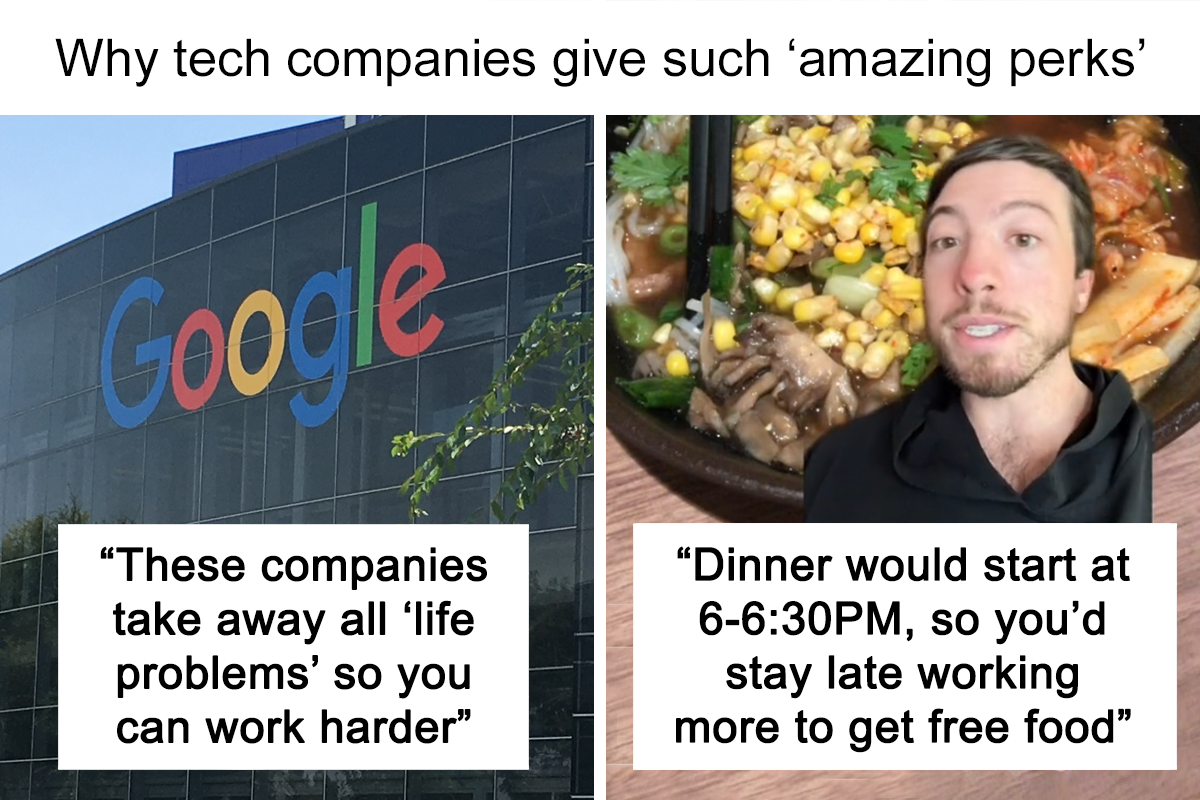
Ex-Google Employee Reveals How Free Perks In The Office Trick Workers Into Actually Working More, Lists Examples From His Job
Interview With AuthorThe last couple of years have really changed how we appreciate being in the office. While the majority of workers (72%) now prefer the hybrid workplace model, with another 13% saying they would completely ditch their office altogether, there’s one thing that hasn’t changed — the free perks that offices grant their workers.
Say what you will but getting delicious meals, caffè macchiatos and unlimited access to a gym for free as part of the package really softens the blow when thinking about that 2-hour commute to and from work. But what if someone told you that these ‘free’ perks aren’t so free after all?
When ex-Google employee Ken Waks shared his two cents on the free perks of one of the finest offices in the world, the Googleplex, which comes with its own basketball court, sleeping pods, 3-course meal deal and other free stuff that can easily woo any mortal’s brainy head — it reached the hearts and minds of 6.4 million TikTok users. Sure, it’s a lot to take in. Nevertheless, his reasoning that all these free office perks are just fancy smoke and mirrors placed there to keep us working longer hours — does make some sense, after all.
Scroll down to see why your free caffè macchiato may not be as free as you think, and let us know what you think in the comments. And if, Dear Pandas, you’re in the mood for more office culture reading — check out this and this, too!
In a viral TikTok with over 6.4 million views, a former Google employee revealed the “dark reasons” behind free and amazing perks that offices around the world grant their workers
Image credits: The Pancake of Heaven!
Image credits: Ken Waks
Ask any bright-eyed IT graduate where they envision themselves working one day, chances are that you’ll hear one of the most commonly used words in the English language that greets 4.3 billion internet users worldwide — Google. One of the most influential companies in existence, the building blocks of the internet as we know it, with almost 135,000 passionate (full-time) workers. And some of them, including Ken, get to be at the heart of it all — the shiny mecca of innovation, Silicon Valley, where lies the second-largest Google office in the world called ‘Googleplex.’
When Ken, Yelp’s local business directory executive at the time, got offered a position at Google, his initial reaction wasn’t different from anyone else who got to step inside (and stay, full-time) this colorful 26-acre “playground for adults.” “Oh my god, this is the Google campus. For someone like me who grew up in a rural town in New Jersey, working for the internet — that was the dream,” Waks told Bored Panda via Zoom call.
Ken was 24-years-old and bright-eyed when he was invited to join the internet’s leading company as a primary operations analyst in 2017. In the next few years, he would quit Google twice and a few more years down the line — he’d make a viral TikTok video about it.
Image credits: Ken Waks
Image credits: Ken Waks
Image credits: Ken Waks
Image credits: Mario Gogh
Image credits: Ken Waks
In 2015, there was a popular story circulating around the internet praising the 23-year-old Google employee who lived in his truck in the company’s parking lot to pay off his student debts and save money. Most people thought that was borderline genius. Ken, on the other hand, had a different take on it.
“This guy was kind of popular around the campus. You know, use the tools that are available to you, right? I didn’t really think too much about it at the time,” Waks explained. But soon, Ken would start thinking about this as more similar-type employees entered the picture. “I had a friend that I went to college with who told me that her cousin was a senior software engineer at Google. This person can write amazing codes. But this guy didn’t go on dates. Didn’t go out. Didn’t have any friends. He’d simply stay at the office until 10:00 PM at night and just go home and crash and come back the next morning.”
This wouldn’t be entirely possible in a regular workplace. But at the Googleplex, where hardworking employees are granted free lunch, sleeping pods, free gym and other sweet perks, hardly imaginable in a regular office — workers can basically have a semi-fulfilling and rent-free life inside the workplace. Ken, however, saw right through it.
“It’s very interesting. It’s kind of like you live, breathe and die it,” he said. “Some people may want that. Me? I kind of like the idea of being able to close my laptop at the end of the day and being like, ‘I’ll see you tomorrow.'” Ken was on to something: in the UK, pre-pandemic, it was estimated that workers rack up to £35 billion (or $46 billion) in unpaid overtime each year. Was it possible that free office perks had anything to do with this phenomenon?
Here’s the TikTok creator explaining all of this in the flesh
@ken Why tech companies give such “amazing perks” #workperks #google #googler #freefood ♬ Love You So – The King Khan & BBQ Show
However, a lot of people were slightly annoyed that someone with such luxurious perks and salary would complain about it in the first place
Ken, who now works as the technical manager at a Fortune One startup based in San Francisco, thinks what we’re seeing now is the beginning of corporates’ larger plan whose origins can be traced back to the 1900s. “There are very clear plans to build company towns, which is a concept that was popularized by mining companies back in the 19th century. You would essentially live at the mine, you sleep at the mine, buy your food from the store there. Which isn’t that far from where we are right now, considering all facts,” Waks reasoned.
Office culture as we know it has also changed since the pandemic. No more do we have to sacrifice precious sleep time commuting back and forth. No more do we have to think just how much money we spend on lunch deals. “The company I work for was able to be very successful during the pandemic because we had started to build out an online presence that ended up being used a lot more than it ever had been,” Waks told. “Last July, they wanted everyone back at the office. I said, ‘I just can’t do it. San Francisco’s too expensive.'”
He was able to convince his current employers that being fully remote won’t alter his effectiveness at the company. “What did I want from a workplace? To be able to leave work, close my laptop and not have it follow me around [all day].” Ken got all that. Plus the ability to continue his journey as a content creator.
1.1Mviews
Share on FacebookMeanwhile, most of the other companies pay less and have no perks... And he is complaining... They give you free transportation, meals, dog care and etc, and in return expect you to do your job and make a specific amount of sales, what a shocker..
Exactly. In my last job I worked 10h a day for minimum salary while being most of the day on my knees deweeding plant pots because the company was too cheap to buy f*****g tables for the pots so we wouldnt break our back. Ask any migrant if you want to know what a hard job is.
Load More Replies..."Wow, so dark" sums this up. "Employer makes life easier and more enjoyable so working doesn't feel like it puts you in shitty positions". Oh no.
He’s also assuming that the same employee gets in the first shuttle bus at 6am and the last shuttle bus at 10pm, rather than parents working staggered schedules so the 6am-3pm parent can coach soccer, while the later shift parent gets the kids to school. Or any other reason people work different hours. And the WiFi in the bus allows you to work on the bus, so you can spend less time working at the office.
Load More Replies...If you're not being chained to the office, you can still leave when you want. You just don't get the free meal.
why wouldn't you get it ? You can leave for walk and come back at dinner time (or just work on personnal stuff once your time is up.)
Load More Replies...I'd rather have an employer taking care of stuff than one saying "tough luck, your own problem how you make it to work". Sure, there are startups trying to weasel around providing decent pay by having pizza Friday and a snooker table or something, but Google doesn't even do that, they pay extremely well.
Yeah, I think there is a valid concern with some jobs that the "perks" cover for a toxic work culture where you can (and will) be asked to work 80 hr weeks. I'm not simply referring to startups either, Activision-Blizzard was known for stuff like this, and for protecting racist and sexist management, and stuff like that is often more the norm for software development than the exception. Google genuinely seems to be an exception though, and while (of course) they want to tempt people into working more for less it rarely seems mandatory, there don't seem to be stupid and abusive "contest" perks and the pay really is good. Google has definitely chased the bottom line more in the last 5-10 years, but compared to most other work it's still genuinely nice. And I guess this guy didn't read his employment contract either?
Load More Replies...I've worked plenty of 12 hour days ( and nights) and had to provide my own transportation, babysitter, food, and hand soap...sometimes I had to provide my own toilet paper. All while making between 10 and 12 bucks an hour. I didn't think there was a problem with that until I read this article. Oh woe is he!
The weirdest people complain about the weirdest shít! I can't even get a goddamn Wingstop to finish doing their job and fill a soda cup (YET 7-ELEVEN MANAGES TO!) and this ásshat is complaining about having to work a 10th hour for fücking DINNER?? DIAF!!!
"Some employers make it easier and more enjoyable to work there, it's an evil conspiracy!" How ridiculous. This guy is so deluded about how most people live.
Is he honestly expecting us to believe that he wasn't aware of any of this, and thought it was a trick? Of course the company isn't just handing out free perks out of the goodness of the heart it doesn't have.
In my job we don't get Google-level perks but I do work in a nice office with a fantastic view (plus rooftop terrace a few steps away), free breakfast and lunches, an actually comfortable office chair (that I know is expensive) and height adjustable desk + a great yoga class every week. And I don't care one second it's all there to make me work more. It makes the whole experience way more enjoyable than if those things weren't there. And make no mistake - I'm no manager, in the office ladder I'm pretty much scum but I still get these benefits and feel nothing bad about enjoying them.
I'm no fan of Google, but I hate that articles like this treat stuff like being a dog-friendly workplace like it's some sort of dirty trick. Yes, "if you work late, we'll feed you" is great. They're not giving you these perks as a trade-off for salary; they're giving them because they believe they'll increase productivity, so asking for the value in salary is just dumb.
For almost 30 years I worked for a company that "gave" me a 1% 401k match. An executive poobah saw me in the cafeteria one day and immediately slithered to my supervisor's office to tell him to tell me I wasn't allowed in the cafeteria. Hahahahaha. I can laugh about it and at them now.
I have mixed feelings about this. A wealthy global and popular company should be taking care of staff. That's how jobs are supposed to work. But if staff feel that they're being bribed to see the workplace as a home from home: "Like why even go home?? Why not just sleep here and go home at the weekends!!!!" then that's less of a 🤗 and more of a 🤔 There a price to pay for most things but your job shouldn't cost you your free time.
The real question is whether there is actual overt pressure and expectation that the workers will sacrifice their work/life balance for the company, or is it their choice whether to enjoy the on-campus perks or leave at the end of the day?
Load More Replies...Guys never worked a government a government job, retail, service, fast-food or a telecom job. This guy's nothing more than a neck beard fedora wearing asshat.
Yea gods, what a entitled a hole. Makes you wonder what would be good enough for him.
Try being a static security guard. 12 hour shifts, zero perks, for me and many others it can be a 2 hour commute one way. You try and fit sleep in wherever and whenever you can, pretty hard if you're not single. And eventually, tiredness catches up with you and if you're caught it's instant dismissal. If the public sees you, they love nothing better than to take your photo and plaster it all over social media. I wouldn't mind sleep pods and 3 course meals that I don't have to find time to go buy and then prepare. Oh and I'd love a shuttle to take me to and from my shift, that's valuable sleep that you can't really get when you're behind the wheel. Must be tough being an entitled douchebag at Google.
I recently retired from my job. Almost 24 years with a semiconductor manufacturing company. I did not receive nearly the pay of a Google employee. I had to work 12 hour days and would get paid for eight hours. I would have loved all of the perks the OP received.
Whats wrong with that, If i dont have to make my self food, go food shopping, buying groroiys as ofter, is that worth iy. you get the time, and get to work. He doesnt have to work on the shuttle, thats his coice. I work way more since i started working at home, but I save on gas, i watch TV and do mindless tasks, its a better trade. So quit your complianing. Spelling*
Free shuttle with wifi ? Enjoy it and do personnal stuffs if you don't want to be the only one with a closed computer. Dogs allowed ? how having them at work does reduce you time caring for them ? take five minute each hour to play and pet. Late free meal ? Quit working on time. Then have a snack, go for a walk or work on personnal stuff -change room to form new habits, it can be hard not to work at your desk. Then, have your free dinner. Time to find portable hobbies ! (or to ask google for a laudry room, so you can take care of some chores between end of worktime and dinner.)
A lot of people who work in IT/Tech are autistic. Having all the little life niggles removed and allowing you to have your dog is a massive anxiety relief. We like being at work, it is structured and interesting and we often have no social lives to go to anyway. I see these "perks" as just common sense if you want to employ neurodiverse staff.
Some ppl don't care about having a bunch of "perks", if you don't mind being a robot, then fine, forget the series you like or any games you used to play, you won't have time for it anyway. What does it matter if you can afford buy a PS5, if you can't play on it anyway? Amazing get coffee, but to get that you need to live on your office? Your whole life is to be a robot for the company, so forget about even posting you opinion freely on sites like these, you'll be too overloaded to look at your phone. These "free" perks aren't so free if you have to stop being yourself and live for the company. I don't know about you guys, but my purpose of making money is so I can enjoy my life with the people I love, it beats the point if you lose your life trying to afford that, but are unable to enjoy it at the end. When'll you be able then? When you're 70 and everything has passed? I'm not working to be a slave, thank you very much.
I totally agree with him. Big companies offer these perks to keep you working for less. I see a lot of ppl agreeing to this, but, first of, it only works if you have absolutely no life outside the job, "high salary" "amazing perks", for what? If you don't have time to spend it anyways? I had a similar job working in AMBEV (a big company that sells beverage, like Budweiser, Pepsi, etc) I was working there as a part-timer who received around 1050 reals (around 217 $), for a part timer, that is an amazing salary, they had a canteen where you'd lunch and also their own transportation to get you home. Sounds great, untill you start working. First of, the transportation does a route, meaning they'll get you earlier so they can afford to take everyone of that route on time for the job. Meaning, you need to sacrifice your sleep to do that, you can't sleep properly on the way, so f* that, and if getting a bus is better for you, tough luck, the company won't allow it.
Wow..... Let's just sell our soul to the company store. Company towns and company stores is the end game of these companies...... Like does anybody else see why this is a problem? Because it is a big one and reading these comments, yinz don't seem to understand why.
Yep, we see this all the time here (in the Silicon Valley.) Then everyone wonders why these guys have the social skills of a rock: they don't go out into "The World" and interact with people that aren't other Google-Facebarf, etc., drones. No grocery shopping, no going out to movies, no wine bar/restaurant dates, etc. The ones I run into at the post office are rude as hell. (and they all drive Teslas, big surprise.)
Twelve THOUSAND per employee?? That is flatout b******t, that is a sales target not a breakeven point. Do people here honestly not remember what feeling locked in felt like during covid? Imagine your job doing that to you. Sure everything can be delivered to you, but you are still trapped indoors. Just because they give you food and a dog walker, is no reason to violate the 40hr workweek. Does NOBODY see this is pulping humans to print more money?! How about we send that free food directly into the worker's gut, and attach the computer to their hands. Better yet, to their brain, so they don't have to move at all. Sound familiar? KNOCK KNOCK, NEO. Humans do not exist to serve companies, companies exist to serve humans.
What's his problem? Is this some sort of condescending joke to the peasants/working class?
New headline: Entitled jerk whines about being expected to actually work for high salary and luxury treatment." Fixed it for you.
Proving no matter what an employer gives someone, there are always those people who still complain about it.
I think it's important to know these perks aren't there for "free". It's difficult to work for some of these companies and have a life outside of work. But there are benefits including the resume benefit after you move on. There will always be people who need to criticize. But there are perks and sacrifices for most jobs.
8 hours work, 8 hours sleep - 8 hours free/sparetime. Denmark in the 60's and 70's... When will you guys learn thart it is when you get of you are a live! It was the unions campaign. A salary you could you could live off!
Y'all are missing the point this may sound spoiled but for some ppl family matters and seeing friends matter traveling to places that isn't this job matters of course if you don't get that you'd love it but this is a "greener grass" situation
Are you aware that most people dont get any perks and still need to do a huge commute and spends 9 or more hours a day at work? You are talking as if the people with no perks work part time from home...
Load More Replies...My husband worked a job where the boss paid really well and it didn't have much overtime if any. Boss was an ass, only holidays were Christmas and Thanksgiving. The only perk was pay, but he never felt appreciated or valued. He started another job in January. It pays a lower wage but he's going to be promoted to a sales position with a much higher wage next month. The owner has a lot of parties and really shows appreciation. He's much happier.
One of those greener grass situations if you don't have the perks of course you'd be like "SO SPOILED HOW COULD HE" but imagine if you got paid a proper living wage so you can have the privacy of your own home plus the "perks" this job gives with money left over to save y'all need to open your eyes to what he's saying
I rather be at home and have personal life. I work in IT, we have free meals, game and so, but no, sorry, rather will work from home. Personal life is precious.
It baffles me how many people want the end result but not the work that led up to it.
I am a woman, an immigrant, and an engineer. Ever since high-school, I've been working my ass off learning to code. I've attended extra classes over summer break. I did a Bachelor's degree, came to the US for a Master's with a 100K loan, worked part-time with full-time school (EACH assignment needed 20+ hours of work, per week), ended up sleeping less than 5 hours for years, had $120 in hand after rent.
After getting a job, paid my student loans for years and now I'm seeking therapy due to work-related stress. My recent job change was after preparing for interviews for 1.5 years (5+ hours/day). Interviewed (6+ hours) with 15+ companies. Got accepted in 1.
I've been learning/coding for over 15 years but it's still overwhelming. BECAUSE IT IS HARD (check out "LeetCode", it's 1% of what we do at work).
I am very fortunate but I've earned it. If you think we are overpaid, learn to code and you'll see. Screen-Sho...95-png.jpg 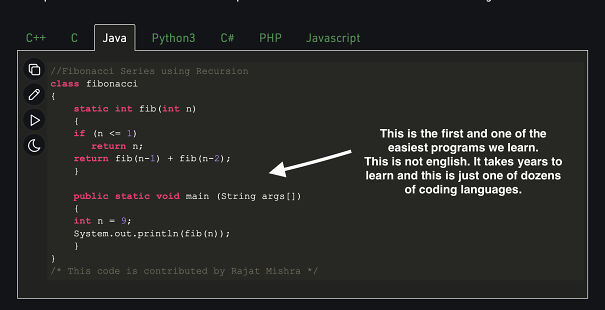
The sad reality of many people living and working now is, that there are tons and tons of jobs that do all the bad you're mentioning without handing over any of the perks that Google and other companies do. For a lot less pay. And "just don't work there then" isn't really an option for most. And especially in the US work life balance is super tough to achieve anyway because of the mostly missing paid days off, sick leave, etc. So I do understand why bashing Google for giving its employees actually good benefits is kinda ridiculous. And I'm fully aware Google isn't doing it out of charitable motivations but to get more work and money out of their employees.
Load More Replies...Meanwhile, most of the other companies pay less and have no perks... And he is complaining... They give you free transportation, meals, dog care and etc, and in return expect you to do your job and make a specific amount of sales, what a shocker..
Exactly. In my last job I worked 10h a day for minimum salary while being most of the day on my knees deweeding plant pots because the company was too cheap to buy f*****g tables for the pots so we wouldnt break our back. Ask any migrant if you want to know what a hard job is.
Load More Replies..."Wow, so dark" sums this up. "Employer makes life easier and more enjoyable so working doesn't feel like it puts you in shitty positions". Oh no.
He’s also assuming that the same employee gets in the first shuttle bus at 6am and the last shuttle bus at 10pm, rather than parents working staggered schedules so the 6am-3pm parent can coach soccer, while the later shift parent gets the kids to school. Or any other reason people work different hours. And the WiFi in the bus allows you to work on the bus, so you can spend less time working at the office.
Load More Replies...If you're not being chained to the office, you can still leave when you want. You just don't get the free meal.
why wouldn't you get it ? You can leave for walk and come back at dinner time (or just work on personnal stuff once your time is up.)
Load More Replies...I'd rather have an employer taking care of stuff than one saying "tough luck, your own problem how you make it to work". Sure, there are startups trying to weasel around providing decent pay by having pizza Friday and a snooker table or something, but Google doesn't even do that, they pay extremely well.
Yeah, I think there is a valid concern with some jobs that the "perks" cover for a toxic work culture where you can (and will) be asked to work 80 hr weeks. I'm not simply referring to startups either, Activision-Blizzard was known for stuff like this, and for protecting racist and sexist management, and stuff like that is often more the norm for software development than the exception. Google genuinely seems to be an exception though, and while (of course) they want to tempt people into working more for less it rarely seems mandatory, there don't seem to be stupid and abusive "contest" perks and the pay really is good. Google has definitely chased the bottom line more in the last 5-10 years, but compared to most other work it's still genuinely nice. And I guess this guy didn't read his employment contract either?
Load More Replies...I've worked plenty of 12 hour days ( and nights) and had to provide my own transportation, babysitter, food, and hand soap...sometimes I had to provide my own toilet paper. All while making between 10 and 12 bucks an hour. I didn't think there was a problem with that until I read this article. Oh woe is he!
The weirdest people complain about the weirdest shít! I can't even get a goddamn Wingstop to finish doing their job and fill a soda cup (YET 7-ELEVEN MANAGES TO!) and this ásshat is complaining about having to work a 10th hour for fücking DINNER?? DIAF!!!
"Some employers make it easier and more enjoyable to work there, it's an evil conspiracy!" How ridiculous. This guy is so deluded about how most people live.
Is he honestly expecting us to believe that he wasn't aware of any of this, and thought it was a trick? Of course the company isn't just handing out free perks out of the goodness of the heart it doesn't have.
In my job we don't get Google-level perks but I do work in a nice office with a fantastic view (plus rooftop terrace a few steps away), free breakfast and lunches, an actually comfortable office chair (that I know is expensive) and height adjustable desk + a great yoga class every week. And I don't care one second it's all there to make me work more. It makes the whole experience way more enjoyable than if those things weren't there. And make no mistake - I'm no manager, in the office ladder I'm pretty much scum but I still get these benefits and feel nothing bad about enjoying them.
I'm no fan of Google, but I hate that articles like this treat stuff like being a dog-friendly workplace like it's some sort of dirty trick. Yes, "if you work late, we'll feed you" is great. They're not giving you these perks as a trade-off for salary; they're giving them because they believe they'll increase productivity, so asking for the value in salary is just dumb.
For almost 30 years I worked for a company that "gave" me a 1% 401k match. An executive poobah saw me in the cafeteria one day and immediately slithered to my supervisor's office to tell him to tell me I wasn't allowed in the cafeteria. Hahahahaha. I can laugh about it and at them now.
I have mixed feelings about this. A wealthy global and popular company should be taking care of staff. That's how jobs are supposed to work. But if staff feel that they're being bribed to see the workplace as a home from home: "Like why even go home?? Why not just sleep here and go home at the weekends!!!!" then that's less of a 🤗 and more of a 🤔 There a price to pay for most things but your job shouldn't cost you your free time.
The real question is whether there is actual overt pressure and expectation that the workers will sacrifice their work/life balance for the company, or is it their choice whether to enjoy the on-campus perks or leave at the end of the day?
Load More Replies...Guys never worked a government a government job, retail, service, fast-food or a telecom job. This guy's nothing more than a neck beard fedora wearing asshat.
Yea gods, what a entitled a hole. Makes you wonder what would be good enough for him.
Try being a static security guard. 12 hour shifts, zero perks, for me and many others it can be a 2 hour commute one way. You try and fit sleep in wherever and whenever you can, pretty hard if you're not single. And eventually, tiredness catches up with you and if you're caught it's instant dismissal. If the public sees you, they love nothing better than to take your photo and plaster it all over social media. I wouldn't mind sleep pods and 3 course meals that I don't have to find time to go buy and then prepare. Oh and I'd love a shuttle to take me to and from my shift, that's valuable sleep that you can't really get when you're behind the wheel. Must be tough being an entitled douchebag at Google.
I recently retired from my job. Almost 24 years with a semiconductor manufacturing company. I did not receive nearly the pay of a Google employee. I had to work 12 hour days and would get paid for eight hours. I would have loved all of the perks the OP received.
Whats wrong with that, If i dont have to make my self food, go food shopping, buying groroiys as ofter, is that worth iy. you get the time, and get to work. He doesnt have to work on the shuttle, thats his coice. I work way more since i started working at home, but I save on gas, i watch TV and do mindless tasks, its a better trade. So quit your complianing. Spelling*
Free shuttle with wifi ? Enjoy it and do personnal stuffs if you don't want to be the only one with a closed computer. Dogs allowed ? how having them at work does reduce you time caring for them ? take five minute each hour to play and pet. Late free meal ? Quit working on time. Then have a snack, go for a walk or work on personnal stuff -change room to form new habits, it can be hard not to work at your desk. Then, have your free dinner. Time to find portable hobbies ! (or to ask google for a laudry room, so you can take care of some chores between end of worktime and dinner.)
A lot of people who work in IT/Tech are autistic. Having all the little life niggles removed and allowing you to have your dog is a massive anxiety relief. We like being at work, it is structured and interesting and we often have no social lives to go to anyway. I see these "perks" as just common sense if you want to employ neurodiverse staff.
Some ppl don't care about having a bunch of "perks", if you don't mind being a robot, then fine, forget the series you like or any games you used to play, you won't have time for it anyway. What does it matter if you can afford buy a PS5, if you can't play on it anyway? Amazing get coffee, but to get that you need to live on your office? Your whole life is to be a robot for the company, so forget about even posting you opinion freely on sites like these, you'll be too overloaded to look at your phone. These "free" perks aren't so free if you have to stop being yourself and live for the company. I don't know about you guys, but my purpose of making money is so I can enjoy my life with the people I love, it beats the point if you lose your life trying to afford that, but are unable to enjoy it at the end. When'll you be able then? When you're 70 and everything has passed? I'm not working to be a slave, thank you very much.
I totally agree with him. Big companies offer these perks to keep you working for less. I see a lot of ppl agreeing to this, but, first of, it only works if you have absolutely no life outside the job, "high salary" "amazing perks", for what? If you don't have time to spend it anyways? I had a similar job working in AMBEV (a big company that sells beverage, like Budweiser, Pepsi, etc) I was working there as a part-timer who received around 1050 reals (around 217 $), for a part timer, that is an amazing salary, they had a canteen where you'd lunch and also their own transportation to get you home. Sounds great, untill you start working. First of, the transportation does a route, meaning they'll get you earlier so they can afford to take everyone of that route on time for the job. Meaning, you need to sacrifice your sleep to do that, you can't sleep properly on the way, so f* that, and if getting a bus is better for you, tough luck, the company won't allow it.
Wow..... Let's just sell our soul to the company store. Company towns and company stores is the end game of these companies...... Like does anybody else see why this is a problem? Because it is a big one and reading these comments, yinz don't seem to understand why.
Yep, we see this all the time here (in the Silicon Valley.) Then everyone wonders why these guys have the social skills of a rock: they don't go out into "The World" and interact with people that aren't other Google-Facebarf, etc., drones. No grocery shopping, no going out to movies, no wine bar/restaurant dates, etc. The ones I run into at the post office are rude as hell. (and they all drive Teslas, big surprise.)
Twelve THOUSAND per employee?? That is flatout b******t, that is a sales target not a breakeven point. Do people here honestly not remember what feeling locked in felt like during covid? Imagine your job doing that to you. Sure everything can be delivered to you, but you are still trapped indoors. Just because they give you food and a dog walker, is no reason to violate the 40hr workweek. Does NOBODY see this is pulping humans to print more money?! How about we send that free food directly into the worker's gut, and attach the computer to their hands. Better yet, to their brain, so they don't have to move at all. Sound familiar? KNOCK KNOCK, NEO. Humans do not exist to serve companies, companies exist to serve humans.
What's his problem? Is this some sort of condescending joke to the peasants/working class?
New headline: Entitled jerk whines about being expected to actually work for high salary and luxury treatment." Fixed it for you.
Proving no matter what an employer gives someone, there are always those people who still complain about it.
I think it's important to know these perks aren't there for "free". It's difficult to work for some of these companies and have a life outside of work. But there are benefits including the resume benefit after you move on. There will always be people who need to criticize. But there are perks and sacrifices for most jobs.
8 hours work, 8 hours sleep - 8 hours free/sparetime. Denmark in the 60's and 70's... When will you guys learn thart it is when you get of you are a live! It was the unions campaign. A salary you could you could live off!
Y'all are missing the point this may sound spoiled but for some ppl family matters and seeing friends matter traveling to places that isn't this job matters of course if you don't get that you'd love it but this is a "greener grass" situation
Are you aware that most people dont get any perks and still need to do a huge commute and spends 9 or more hours a day at work? You are talking as if the people with no perks work part time from home...
Load More Replies...My husband worked a job where the boss paid really well and it didn't have much overtime if any. Boss was an ass, only holidays were Christmas and Thanksgiving. The only perk was pay, but he never felt appreciated or valued. He started another job in January. It pays a lower wage but he's going to be promoted to a sales position with a much higher wage next month. The owner has a lot of parties and really shows appreciation. He's much happier.
One of those greener grass situations if you don't have the perks of course you'd be like "SO SPOILED HOW COULD HE" but imagine if you got paid a proper living wage so you can have the privacy of your own home plus the "perks" this job gives with money left over to save y'all need to open your eyes to what he's saying
I rather be at home and have personal life. I work in IT, we have free meals, game and so, but no, sorry, rather will work from home. Personal life is precious.
It baffles me how many people want the end result but not the work that led up to it.
I am a woman, an immigrant, and an engineer. Ever since high-school, I've been working my ass off learning to code. I've attended extra classes over summer break. I did a Bachelor's degree, came to the US for a Master's with a 100K loan, worked part-time with full-time school (EACH assignment needed 20+ hours of work, per week), ended up sleeping less than 5 hours for years, had $120 in hand after rent.
After getting a job, paid my student loans for years and now I'm seeking therapy due to work-related stress. My recent job change was after preparing for interviews for 1.5 years (5+ hours/day). Interviewed (6+ hours) with 15+ companies. Got accepted in 1.
I've been learning/coding for over 15 years but it's still overwhelming. BECAUSE IT IS HARD (check out "LeetCode", it's 1% of what we do at work).
I am very fortunate but I've earned it. If you think we are overpaid, learn to code and you'll see. Screen-Sho...95-png.jpg 
The sad reality of many people living and working now is, that there are tons and tons of jobs that do all the bad you're mentioning without handing over any of the perks that Google and other companies do. For a lot less pay. And "just don't work there then" isn't really an option for most. And especially in the US work life balance is super tough to achieve anyway because of the mostly missing paid days off, sick leave, etc. So I do understand why bashing Google for giving its employees actually good benefits is kinda ridiculous. And I'm fully aware Google isn't doing it out of charitable motivations but to get more work and money out of their employees.
Load More Replies...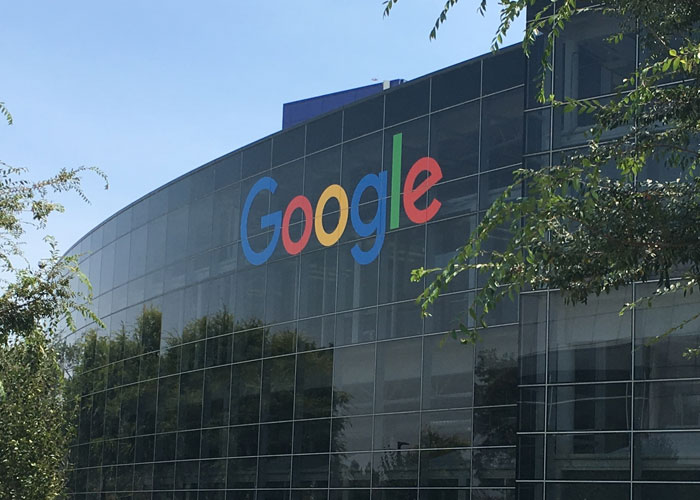
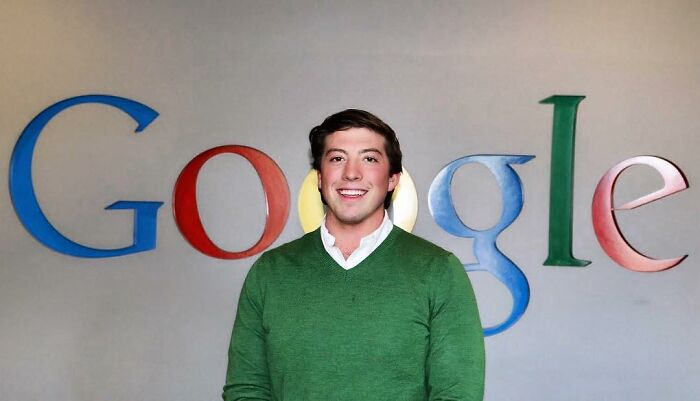
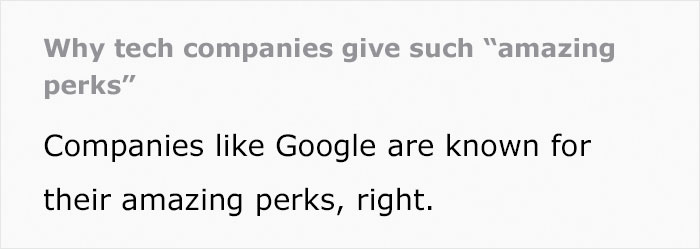


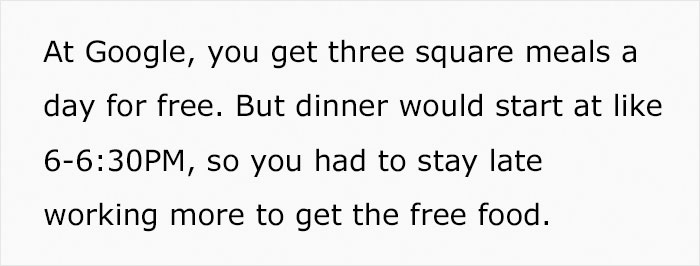
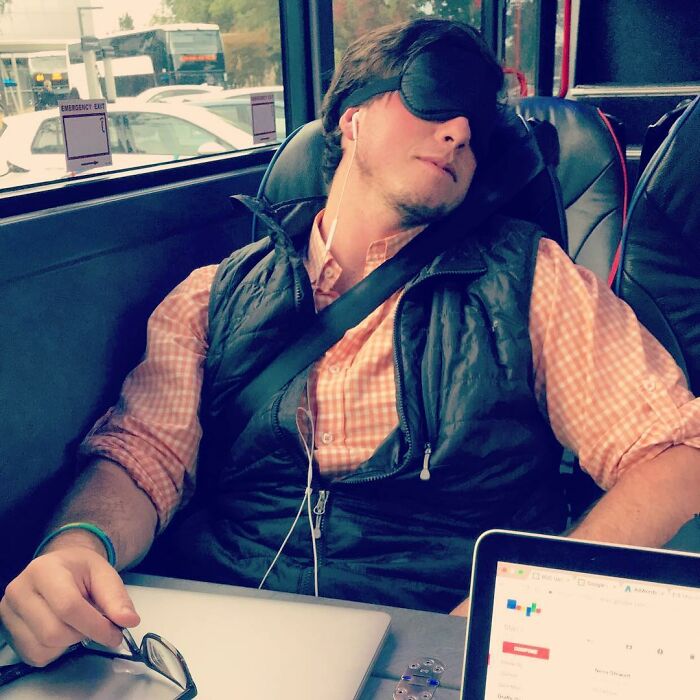
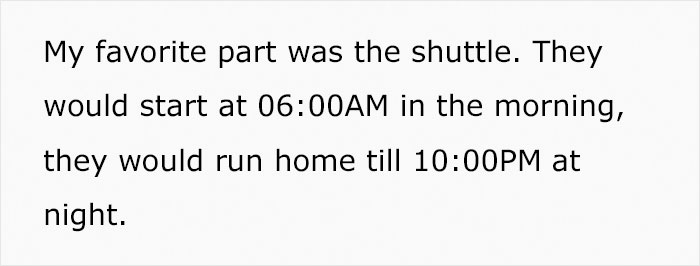


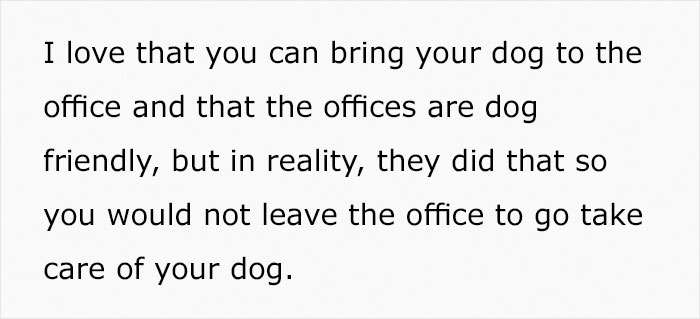



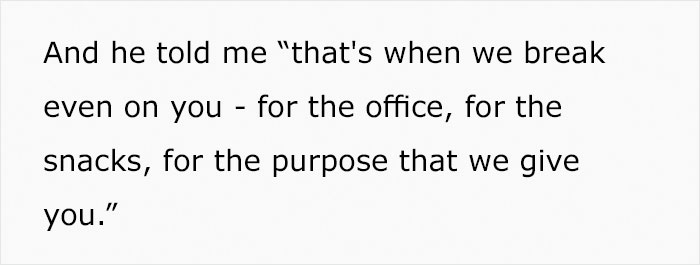


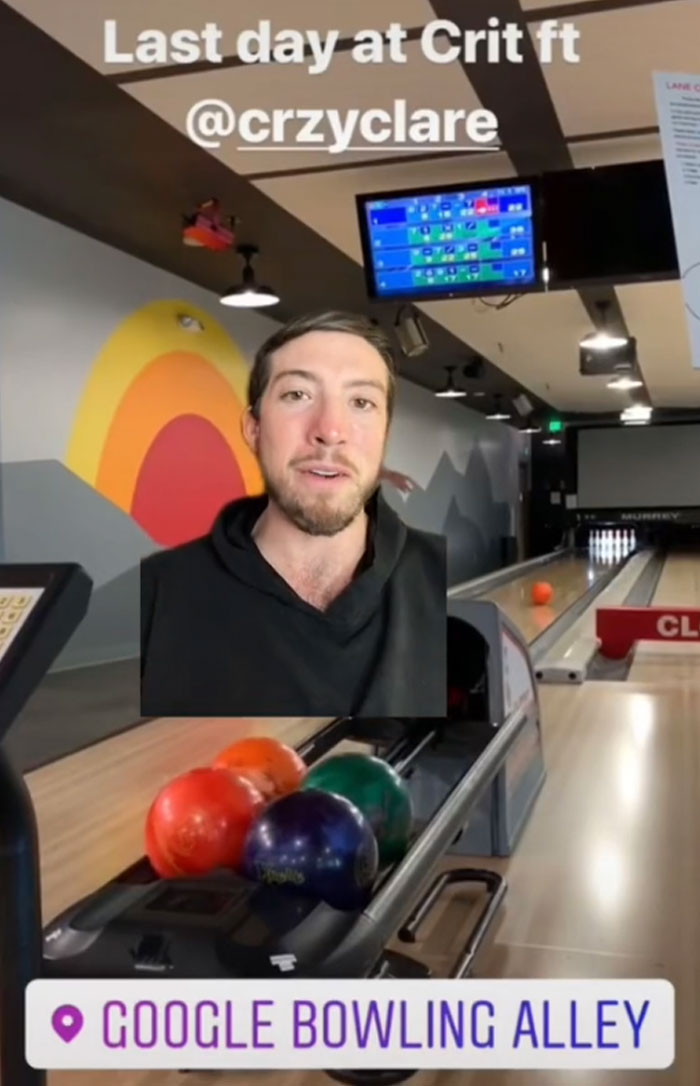
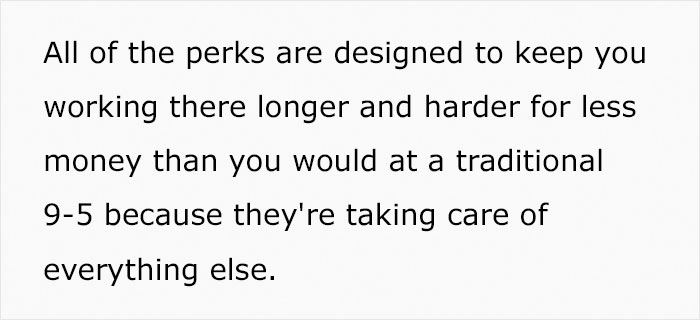
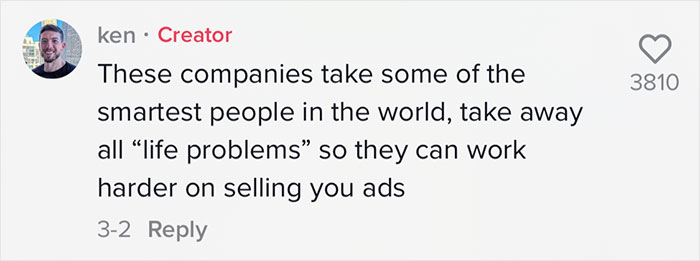


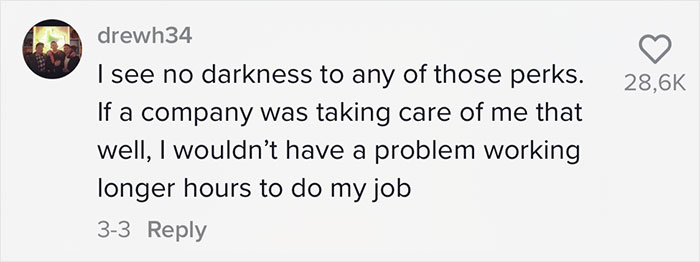




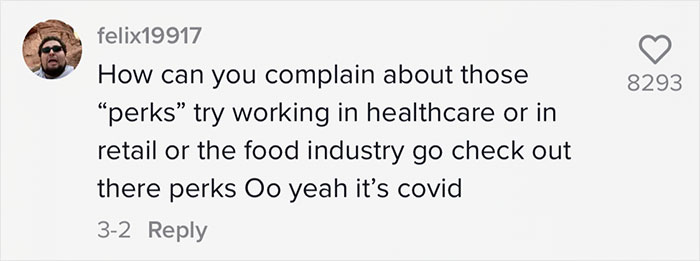










69
70